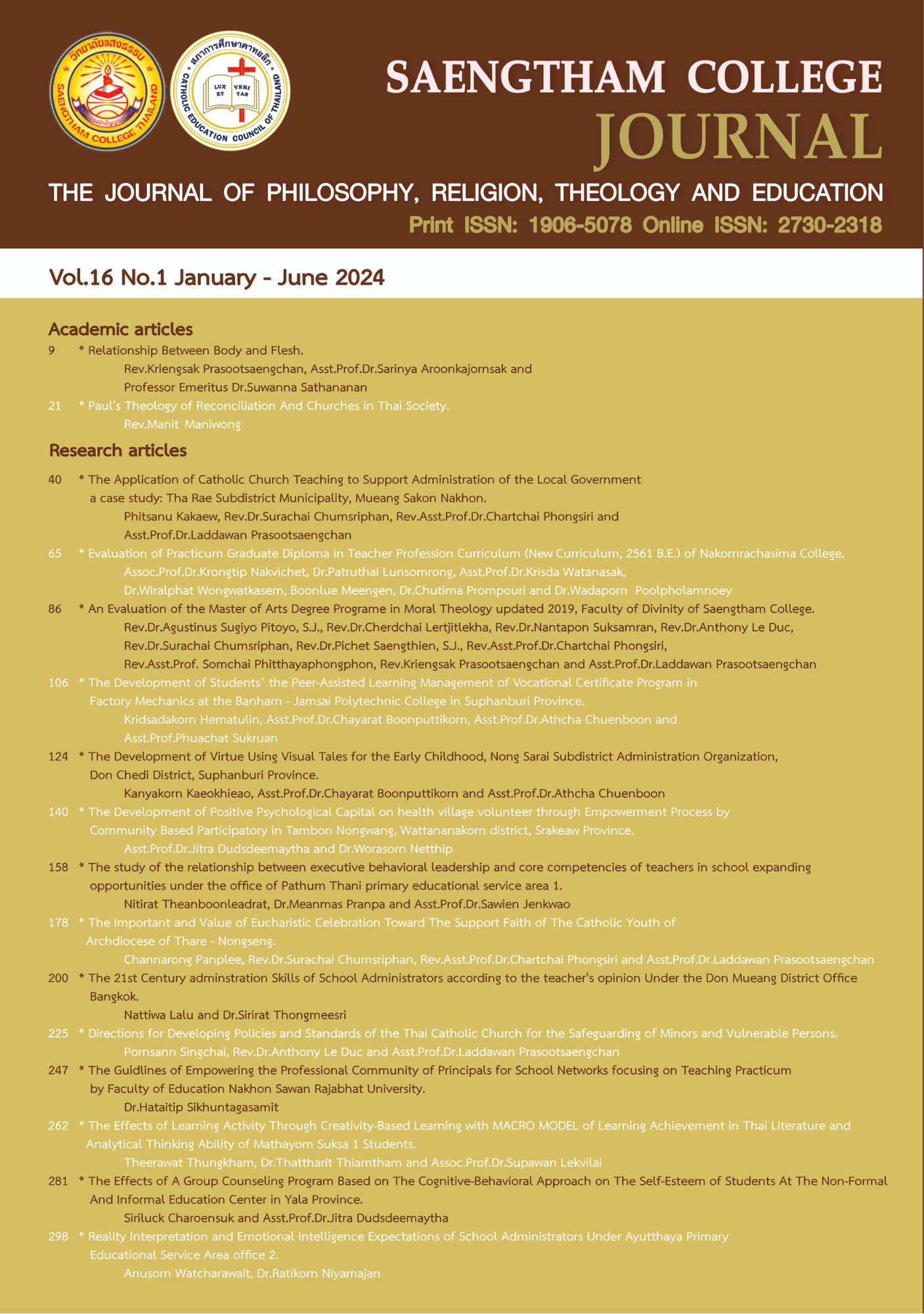Paul's Theology of Reconciliation And Churches in Thai Society
Main Article Content
Abstract
During this decade Thai society has experienced quite a number of various conflicts. These conflicts could be resolved via reconciliation in Paul’s theology through Thai Churches, who have to initiate reconciliation in the society. Reconciliation in Paul’s theology was influenced by Greek and Jewish cultures including Christ’s ministries in the Four Gospels. Reconciliation in Paul’s Theology can be summarized as follows: 1) God is the one who initiated reconciliation to humans, who have betrayed Him by means of Christ, His only Son being crucified to atone for humans’ sins and redeemed us to be reconciled with God. (Rom. 5:10). Reconciliation by means of atonement was derived from Greek and Jewish cultures. However, for the atoner Paul derived the ideology from Jewish culture that the right-side initiates reconciliation. 2) Reconciliation is based on God’s righteousness. 3) Reconciliation is both vertical - God reconciles with humans, and horizontal - humans reconcile with humans. (Eph. 2:5-22) 4) Horizontal reconciliation includes humans reconciling with nature. (Col. 1:19-20) 5) humans who have been reconciled with God should cooperate with Him in initiating reconciliation both vertically and horizontally. (2 Cor. 5:17-21) The following are suggestions for applying reconciliation in Paul’s theology: 1) Churches in Thai society should set a model as an initiator for reconciliation. 2) Thai churches, who have been reconciled by God should reveal the fruits of reconciled lives by living with others in the society with peace and love. 3) Thai churches should not only reconcile vertically - receiving salvation from God or bringing others for salvation but also horizontally - respecting others in the society no matter how different our social statuses are. 4) Thai churches should reconcile with nature so that we can live with it joyfully and peacefully like the Garden of Eden; also to set a model of the new system or God’s Kingdom to come on the Last Days. 5) Thai churches should cooperate with God in the ministry of reconciliation devotedly and wholeheartedly until the Second Coming.
Article Details

This work is licensed under a Creative Commons Attribution-NonCommercial-NoDerivatives 4.0 International License.
- The academic and research articles, as well as the content and opinions expressed therein, published in Saengtham College Journal are solely the responsibility of the respective author(s).
- Articles published in Saengtham College Journal are the property of Saengtham College. Reproduction, modification, or dissemination of all or part of the content in any form without written permission from Saengtham College is prohibited.
- Articles published in Saengtham College Journal are protected under the Copyright Act.
References
เจาะลึกระบบสุขภาพ. (2564, 22 ตุลาคม). เผยคนไทย 38 ล้านคนอยู่ในพื้นที่ฝุ่นพิษเกิน มาตรฐาน ต้นเหตุป่วยพุ่ง!. https://www.hfocus.org/content/2021/10/23451
เจ. เอส, เวล. (1961). อรรถาธิบายหลักคำสอนของคริสตศาสนา. สุริยบรรณ.
พงษ์ศักดิ์ ลิ่มทองวิรัตน์. (2566). 2 โครินธ์. สถาบันพระคริสตธรรมในประเทศไทย.
มติชนออนไลน์. (2562, 12 เมษายน). อึ้ง! ‘โป๊ป’ ก้มจูบเท้า ‘คู่ขัดแย้งซูดานใต้’ ขอร้องให้ ‘รักษาสันติภาพ’. https://www.matichon.co.th/foreign/news_1448246
วิลเลียม อี. ฮอร์เดิร์น. (2520). คริสตศาสนศาสตร์. สุริยบรรณ.
Beale, Gregory K. (1994). “The Old Testament Background of Reconciliation in 2 Corinthians 5-7 and Its Bearing on the Literary Problem of 2 Corinthians 6:14-7:1.” 217-247 in The Right Doctrines from the Wrong Text? Edited by Gregory K. Beale. Baker.
Blackman, E. C. (1981). Reconciliation. In The Interpreter’s Dictionary of the Bible.
Büchsel, Friedrich. (1987) “ἀλλáσσω, ἀντáλλαµα, àπ-, δι-, καταλλáσσω, καταλλαγή, àποκατ-, µεταλλáσσω” Pages 251-259 in vol. 1 of Theological Dictionary of the New Testament. Eerdmans.
De Gruchy, J.W. (2002). Reconciliation: Restoring justice. Fortress Press.
Driver, S. R. (1912). Expiation and Atonement. In Encyclopedia of Religion and Ethics (Vol. 5). T. & T. CLARK.
Fitzgerald, J. T. (2001). Paul and Paradigm Shifts: Reconciliation and Its Linkage Group. In T. Engberg-Pedersen (Ed.), Paul Beyond the Judaism/Hellenism Divide (pp. 241–260). Westminster John Knox Press.
Gloer, W. Hulitt. (1996). An Exegetical and Theological Study of Paul’s Understanding of New Creation and Reconciliation in 2 Cor. 5:14-21. The Edwin Mellen Press.
Hauck. (1987). miasma (Miasma). In G. Kittel & G. Friedrich (Eds.), Theological Dictionary of the New Testament (Vol.1). Eerdmans.
Knopf, R. (1914). Paul and Hellenism. The American Journal of Theology, 18(4), 497–520.
Kraus, H.-J. (1966). Worship in Israel: A Cultic History of the Old Testament. John Knox Press.
Longenecker, R. N. (2016). The Epistle to the Romans. Eerdmans.
Martin, R. P. (1980). New Testament Theology: A Proposal: The Theme of Reconciliation. The Expository Times, 91(12), 364–368.
Moltmann, J. (1993). God in Creation: A New Theology of Creation and the Spirit of God. Fortress Press.
Morris, L. (1999). The Cross in the New Testament. Eerdman.
Picirilli, R. E. (2017). Paul The Apostle: Missionary, Martyr, Theologian. Moody Publishers.
Porter, S. E. (2016). The Apostle Paul: His Life, Thought, and Letters. Wm. B. Eerdmans Publishing Co.
Porter, S. E. (2011). Reconciliation as the Heart of Paul’s Missionary Theology. In T. J. Burke & B. S. Rosner (Eds.), Paul as Missionary: Identity, Activity, Theology, and Practice (1st edition, pp.169–179). T&T Clark.
Roetzel, Calvin J. (1991). The Letters of Paul: Conversations in Context. Westminster John Knox Pr.
Shedd, William G. T. (1980). Commentary on Romans. Wipf and Stock.
Stuhlmacher, P. (1979). The Gospel of Reconciliation in Christ—Basic Features and Issues of a Biblical Theology of the New Testament. Horizons in Biblical Theology, 1(1), 161–190. https://doi.org/10.1163/187122079X00076
Yerkes, R. K., & Wach, J. (1953). Sacrifice in Greek and Roman Religions and Early Judaism (Reprint edition). Wipf and Stock.


